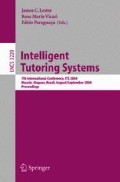Abstract
Some researchers have argued that algebra word problems are difficult for students because they have difficulty in comprehending English. Others have argued that because algebra is a generalization of arithmetic, and generalization is hard, it’s the use of variables, per se, that cause difficulty for students. Heffernan and Koedinger [9] [10] presented evidence against both of these hypotheses. In this paper we present how to use tutorial log files from an intelligent tutoring system to try to contribute to answering such questions. We take advantage of the Power Law of Learning, which predicts that error rates should fit a power function, to try to find the best fitting mathematical model that predicts whether a student will get a question correct. We decompose the question of “Why are Algebra Word Problems Difficult?” into two pieces. First, is there evidence for the existence of this articulation skill that Heffernan and Koedinger argued for? Secondly, is there evidence for the existence of the skill of “composed articulation” as the best way to model the “composition effect” that Heffernan and Koedinger discovered?
Access this chapter
Tax calculation will be finalised at checkout
Purchases are for personal use only
Preview
Unable to display preview. Download preview PDF.
References
Anderson, J.R., Lebiere, C.: The Atomic Components of Thought. Lawrence Erlbaum Associates, Mahwah (1998)
Baker, R.S., Corbett, A.T., Koedinger, K.R.: Statistical Techniques for Comparing ACT-R Models of Cognitive Performance. Presented at 10th Annual ACT-R Workshop (2003)
Corbett, A.T., Anderson, J.A.: Knowledge tracing in the ACT programming tutor. In: Proceedings of 14th Annual Conference of the Cognitive Science Society (1992)
Corbett, A.T., Anderson, J.R., O’Brien, A.T.: Student modeling in the ACT programming tutor. In: Nichols, P., Chipman, S., Brennan, R. (eds.) Cognitively Diagnostic Assessment. ch. 2, Erlbaum, Hillsdale (1995)
Draney, K.L., Pirolli, P., Wilson, M.: A measurement model for a complex cognitive skill. In: Nichols, P., Chipman, S., Brennan, R. (eds.) Cognitively Diagnostic Assessment, Erlbaum, Hillsdale (1995)
Embretson, S.E., Reise, S.P.: Item Response Theory for Psychologists Lawrence Erlbaum Assoc. (2000)
Heffernan, N.T.: Intelligent Tutoring Systems have Forgotten the Tutor: Adding a Cognitive Model of an Experienced Human Tutor. Dissertation & Technical Report. Carnegie Mellon University, Computer Science (2001), http://www.algebratutor.org/pubs.html
Heffernan, N.T.: Web-Based Evaluations Showing both Cognitive and Motivational Benefits of the Ms. Lindquist Tutor. In: 11th International Conference Artificial Intelligence in Education, Syndey, Australia (2003)
Heffernan, N.T., Koedinger, K.R.: The composition effect in symbolizing: the role of symbol production versus text comprehension. In: Proceeding of the Nineteenth Annual Conference of the Cognitive Science Society, pp. 307–312. Lawrence Erlbaum Associates, Hillsdale (1997)
Heffernan, N.T., Koedinger, K.R.: A developmental model for algebra symbolization: The results of a difficulty factors assessment. In: Proceedings of the Twentieth Annual Conference of the Cognitive Science Society, pp. 484–489. Lawrence Erlbaum Associates, Hillsdale (1998)
Junker, B., Koedinger, K.R., Trottini, M.: Finding improvements in student models for intelligent tutoring systems via variable selection for a linear logistic test model. Presented at the Annual North American Meeting of the Psychometric Society, Vancouver, BC, Canada (2000), http://lib.stat.cmu.edu/~brian/bjtrs.html
Koedinger, K.R., Junker, B.: Learning Factors Analysis: Mining student-tutor interactions to optimize instruction. Presented at Social Science Data Infrastructure Conference. New York University. November 12-13 (1999)
Koedinger, K.R., MacLaren, B.A. (2002), Developing a pedagogical domain theory of early algebra problem solving. CMU-HCII Tech Report 02-100. Accessible via, http://reports-archive.adm.cs.cmu.edu/hcii.html
Nathan, M.J., Kintsch, W., Young, E.: A theory of algebra-word-problem comprehension and its implications for the design of learning environments. Cognition & Instruction 9(4), 329–389 (1992)
Nathan, M.J., Koedinger, K.R.: Teachers’ and researchers’ beliefs about the development of algebraic reasoning. Journal for Research in Mathematics Education 31, 168–190 (2000)
Newell, A., Rosenbloom, P.: Mechanisms of skill acquisition and the law of practice. In: Anderson (ed.) Cognitive Skills and Their Acquisition, Erlbaum, Hillsdale (1981)
Raftery, A.E.: Bayesian model selection in social research. In: Marsden, P.V. (ed.) Sociological Methodology, pp. 111–196. Blackwells, Cambridge (1995)
Author information
Authors and Affiliations
Editor information
Editors and Affiliations
Rights and permissions
Copyright information
© 2004 Springer-Verlag Berlin Heidelberg
About this paper
Cite this paper
Croteau, E.A., Heffernan, N.T., Koedinger, K.R. (2004). Why Are Algebra Word Problems Difficult? Using Tutorial Log Files and the Power Law of Learning to Select the Best Fitting Cognitive Model. In: Lester, J.C., Vicari, R.M., Paraguaçu, F. (eds) Intelligent Tutoring Systems. ITS 2004. Lecture Notes in Computer Science, vol 3220. Springer, Berlin, Heidelberg. https://doi.org/10.1007/978-3-540-30139-4_23
Download citation
DOI: https://doi.org/10.1007/978-3-540-30139-4_23
Publisher Name: Springer, Berlin, Heidelberg
Print ISBN: 978-3-540-22948-3
Online ISBN: 978-3-540-30139-4
eBook Packages: Springer Book Archive

